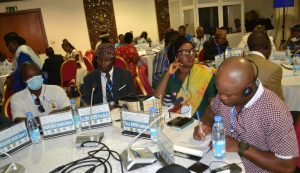The community leaders were trained during a four-day workshop organised in Yaounde by African Alliance for Developmental Action, AADA.
The workshop which ended on September 9, was organised in partnership with the US government’s Forest Service and the Department of Justice.
The workshop brought together over 50 communities leaders from different parts of the country.
According to AADA’s Chief Executive Officer, Ayuk Raphael, equipping the community leaders, who are custodian of the forest, is crucial in fighting against trafficking of timber in the country.
“They are the custodians of the forest and no activity can take place in the forest without the knowledge of the custodians. That is why we think it is very important following the laws of the country to build their capacities to fight illegal logging with the collaboration the State,” AADA CEO said.
He continued that AADA aims to accompany the government in empowering the leaders, especially from forest communities and communities around national parks and protected areas, to be aware of the resources around them.
“These people depend on the forest and poverty is directly connected to the forest because once the forest is not in place, the community suffer first. That is why we see it necessary to start with the community at this level,” Ayuk added.
He reiterated that: “Sometimes those bringing conflict in the communities get their funding from illegal exploitation and they destabilise the state. So we have to look at all these to make sure our country is in peace and has good income from their resources. That is why we are so committed in this fight”.
During the four days of the capacity building workshop, the participants are being drilled on modules such as how to appreciate their forest, monitor their forest and how to alert government authorities in case of any illegal activity going on.

The Divisional Delegate of Forestry and Wildlife for Menchum in the North West Region, Deba Samson, explained that most communities are ignorant of their rights and responsibilities towards the conservation of natural resources.
“The problem we face in the field is that, the local population are ignorant of their rights and responsibilities towards the conservation of the natural resources around them, especially forestry and wildlife,” he said, adding that “Whereas the 1994 Forestry and Wildlife Law makes provision for total inclusion and participation of the local population in order for the forestry and wildlife resources to be properly managed. So this workshop was a forum for them to be drilled on this aspect”.
The delegate stressed that the participants will serve as trainers in their respective communities to empower them surround the sustainable management of the forest resources.








